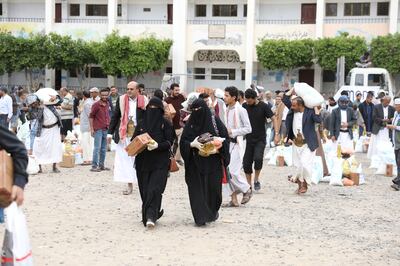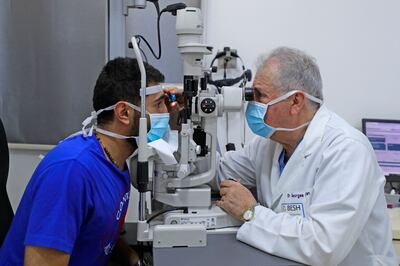Despite relatively low levels of general awareness and knowledge about its applications in the Middle East and North Africa, blockchain technology is rapidly gaining momentum. Whether the region chooses to step up its adoption depends largely on the availability of regulatory frameworks, an enabling ecosystem as well as confidence in the added value and security the technology offers.
New economic activities, cost reduction, transparency and security represent the main benefits encouraging public and private sector organisations to adopt blockchain technology. While many expect it to revolutionise numerous sectors, it is still in its "proof of concept" stage and yet to go mainstream. This is good news for a region where several countries are struck by a prolonged socio-economic impasse, whereby the advent of blockchain could mark a great opportunity to make a noticeable change.
Globally, blockchain is having an impact on major sectors with pilot projects in place to evaluate its feasibility. Nations such as the US, Canada, China, Japan and countries in Western Europe are witnessing impressive growth in blockchain investments.
In an effort to develop a global supply chain platform, enterprise software giant SAP was one of the first few to establish a blockchain consortium comprising firms such as HP, Intel, UPS and Airbus. Today, dozens of such consortiums exist globally, bringing together businesses from various sectors such as banking, transport and hospitality, among others.
Blockchain solutions have yet to expand into a full-blown implementation in the Mena region or even globally. However, our region has begun embracing the transformative technology, which promises a positive impact on local communities and economies.
The proliferation of blockchain in the region has been mainly seen in crypto, NFTs and the financial services sector. Being an early adopter, the sector is leveraging the technology in banking, remittances, securities and investments.
Vast blockchain spending is expected to focus on manufacturing, retail and professional services sectors in the years to come. IT and business services will also account for the majority of all blockchain spending this year. Other sectors such as food and health care can also benefit from the technology.
Poverty, conflict, unemployment, poor quality of education and scarcity of resources such as electricity are some of the most common socio-economic issues facing a number of countries in the Mena region today. But where there are challenges there are bound to be opportunities as well, and there is little doubt a number of sectors stand to benefit from the so-called Web3 applications.
Governments, for instance, can use blockchain for record keeping, from real estate transactions to student loan disbursements and tracking of humanitarian aid. Such use cases may reduce corruption, fraud and cost by steering away from the obscurity of typical government transactions and paper use. Port authorities around the globe, for instance, have been using the technology to develop tamper-proof methods to track shipments. The goal is to ensure payments reach the right parties, eliminating fraudulent accounts and money laundering.
Corruption is such an all-pervasive problem in several countries in the Middle East, particularly conflict-ridden ones, that, even though donors want to support humanitarian efforts, they are often hesitant to do so, fearing misuse of donations. Blockchain offers donors and philanthropies a high level of transparency about how their contributions are being distributed among beneficiaries. The technology is likely to amplify donations towards various causes, from food and medical supplies to education and infrastructure. In effect, this move could alleviate poverty and improve the quality of life in underprivileged communities.

Another form of corruption is piracy. Anti-piracy organisations and local authorities are working hand-in-glove to crack down on counterfeit music, films and other products. Purchasing songs and music using cryptocurrency could eliminate copyright infringement. As a result, an enabling environment for budding artists could emerge, allowing them to reach their audience directly without bearing the cost of distributors.
Blockchain can also serve as a global platform for patients’ medical records, eliminating the risk of hacking or deletion. A decentralised ledger of medical data may help provide the necessary insights to fight disease, while supporting the allocation of humanitarian aid in war-torn countries.
Land ownership records in our region, too, are vague and susceptible to tampering through bribery. Blockchain allows tracking of land ownership history, verifying registrations and running background checks on payments, title deeds and taxes. In fact, in more developed markets such as the UAE, real estate is being tokenised as a means of trade. Landlords can now issue blockchain-based tokens, which represent the value of their shares in certain assets. In addition, many developers and real estate agencies have started selling land and virtual properties as NFTs.
Another major challenge, particularly in countries suffering from unrest or emerging from it, has been the lack of regular power supply. But with the help of the technology, consumers can share their energy with their neighbours for a fee.
This is a useful option to have not just in unstable environments but in stable ones too, where a consumption model called the "sharing economy" is becoming increasingly popular, particularly among millennials. As the short-term lease of some products and services gradually replaces full ownership by a single person or entity, the use of blockchain can yield positive results for Mena-based businesses and individuals while tackling pollution and saving resources.

A new technology becomes infinitely more important if it can enable financial inclusion. And blockchain has proved to be handy for lenders who want to extend micro-loans to people in disadvantaged communities with no access to banking services. Street vendors, for instance, will need minimal financial support to set up food stalls. The technology allows micro entrepreneurs to borrow money without the need for the thorough credit checks currently required by banks, leading to a reduction in unemployment.
According to the World Bank, 1.7 billion people around the globe are unbanked. But for those living in remote areas or conflict zones, where banks are not present, blockchain can come in handy. The technology also facilitates faster and more cost-efficient transactions such as remittances, which many families across the region rely on to secure a decent living.
Furthermore, consumers can track their foods from farm to counter. Of particular interest to the Middle East, consumers might be able to tell whether the food is Halal-based on food source and preparation methods. They can also verify and ensure various aspects of food security and quality or the source of food contamination.
The potential benefits of the technology, therefore, are amply clear. But in order to perfect it, one needs to be patient.
When a new medicine is produced or an innovative therapy is developed, it undergoes a series of rigorous tests and approvals before being administered to patients. It may take months and even years before tangible benefits materialise. Even the most promising innovations will face obstacles throughout their pilot phase. Blockchain may have emerged nearly 15 years ago. But no different than a groundbreaking medication en route to achieving its full potential, this technology appears to be a promising panacea for a set of socio-economic issues our region is facing.




